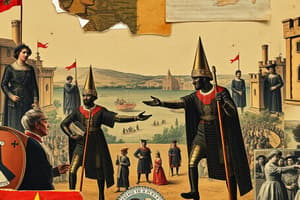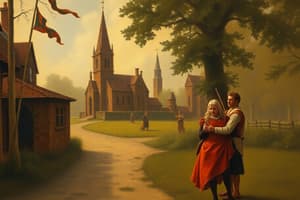Podcast
Questions and Answers
The 1066 __________ invasion led to the French-speaking Normans becoming a conqueror people.
The 1066 __________ invasion led to the French-speaking Normans becoming a conqueror people.
Norman
The Norman rule was troubled by problems of __________, internal conflicts and opposition from Anglo-Saxon population.
The Norman rule was troubled by problems of __________, internal conflicts and opposition from Anglo-Saxon population.
succession
The English kings began to claim 'overlordship' to the whole of the British Isles, demanding __________ from all other rulers.
The English kings began to claim 'overlordship' to the whole of the British Isles, demanding __________ from all other rulers.
obedience
The English kingdom descended into a crisis and a civil war known as the '___________ of the Roses'.
The English kingdom descended into a crisis and a civil war known as the '___________ of the Roses'.
The '___________ Carta' was issued in 1215 as a result of the dissatisfaction among barons over royal policy.
The '___________ Carta' was issued in 1215 as a result of the dissatisfaction among barons over royal policy.
The Councils were referred to as __________ in order to raise funds with the consent of their subjects.
The Councils were referred to as __________ in order to raise funds with the consent of their subjects.
The English kings held the upper hand for a long time, but were eventually thrown out of __________.
The English kings held the upper hand for a long time, but were eventually thrown out of __________.
The barons disavowed their allegiance to the ______ and the price for renewing it was for the King to sign the Magna Carta.
The barons disavowed their allegiance to the ______ and the price for renewing it was for the King to sign the Magna Carta.
The Magna Carta was reissued for King John's infant son and heir ______ III.
The Magna Carta was reissued for King John's infant son and heir ______ III.
The Magna Carta was a written document which limited the arbitrary exercise of the ______ will and stated the rights of some of the Crown's subjects.
The Magna Carta was a written document which limited the arbitrary exercise of the ______ will and stated the rights of some of the Crown's subjects.
The term 'Parliament' comes from the French word ______, meaning to speak.
The term 'Parliament' comes from the French word ______, meaning to speak.
In 1265, Simon de Montfort introduced the beginnings of popular representation by summoning 2 ______ from each shire.
In 1265, Simon de Montfort introduced the beginnings of popular representation by summoning 2 ______ from each shire.
The 'Model Parliament' of 1295 established the pattern for future parliaments and was truly representative of all three ______ of medieval society.
The 'Model Parliament' of 1295 established the pattern for future parliaments and was truly representative of all three ______ of medieval society.
In 1341, the Commons were from now on housed in a chamber of their ______.
In 1341, the Commons were from now on housed in a chamber of their ______.
The power of Parliament increased despite autocratic rule by the ______ in the 16th century.
The power of Parliament increased despite autocratic rule by the ______ in the 16th century.
Match the following events with their corresponding dates:
Match the following events with their corresponding dates:
Match the following English monarchs with their corresponding achievements:
Match the following English monarchs with their corresponding achievements:
Match the following terms with their corresponding meanings:
Match the following terms with their corresponding meanings:
Match the following outcomes with their corresponding events:
Match the following outcomes with their corresponding events:
Match the following historical figures with their corresponding achievements:
Match the following historical figures with their corresponding achievements:
Match the following terms with their corresponding historical events:
Match the following terms with their corresponding historical events:
Match the following institutions with their corresponding descriptions:
Match the following institutions with their corresponding descriptions:
Match the following historical events with their corresponding dates:
Match the following historical events with their corresponding dates:
Match the following terms with their definitions:
Match the following terms with their definitions:
Match the following historical figures with their contributions:
Match the following historical figures with their contributions:
Match the following historical documents with their characteristics:
Match the following historical documents with their characteristics:
Match the following historical periods with their events:
Match the following historical periods with their events:
Match the following terms with their meanings:
Match the following terms with their meanings:
Match the following events with their consequences:
Match the following events with their consequences:
Match the following historical events with their significance:
Match the following historical events with their significance:
What was the result of the Norman invasion of 1066?
What was the result of the Norman invasion of 1066?
What was the focus of Henry Plantagenet's policy?
What was the focus of Henry Plantagenet's policy?
What was the outcome of the English kings' claim of 'overlordship'?
What was the outcome of the English kings' claim of 'overlordship'?
What was the result of the 'Hundred Years War'?
What was the result of the 'Hundred Years War'?
What was the Magna Carta issued in response to?
What was the Magna Carta issued in response to?
What was the significance of the 'Councils' in medieval England?
What was the significance of the 'Councils' in medieval England?
What was the outcome of the English kings' meddling in French affairs?
What was the outcome of the English kings' meddling in French affairs?
What was the significance of the Magna Carta in a medieval setting?
What was the significance of the Magna Carta in a medieval setting?
What was the significance of the 'Model Parliament' of 1295?
What was the significance of the 'Model Parliament' of 1295?
What was the result of the barons' dissatisfaction with royal policy in 1215?
What was the result of the barons' dissatisfaction with royal policy in 1215?
What was the significance of the 1341 development in the English parliament?
What was the significance of the 1341 development in the English parliament?
What was the origin of the term 'Parliament'?
What was the origin of the term 'Parliament'?
What was the significance of Simon de Montfort's introduction of popular representation in 1265?
What was the significance of Simon de Montfort's introduction of popular representation in 1265?
What was the result of the power struggle between the monarchy and the parliament in the 16th century?
What was the result of the power struggle between the monarchy and the parliament in the 16th century?
What was the significance of the Magna Carta in limiting the power of the monarch?
What was the significance of the Magna Carta in limiting the power of the monarch?
Flashcards are hidden until you start studying
Study Notes
Norman Conquest and Feudalism
- 1066: Norman invasion of England, French-speaking Normans govern a predominantly English-speaking Anglo-Saxon population.
- Normans introduce 'centralised feudalism', resulting in one of the strongest central governments in Europe during the Middle Ages.
Norman Rule and Succession
- Norman rule troubled by problems of succession, internal conflicts, and opposition from the Anglo-Saxon population.
- Civil War in England from 1135 to 1154.
- Henry Plantagenet inherits the throne in 1154 and pursues a 'French' policy, focusing on retaining French possessions using England as a 'war chest'.
The Magna Carta
- 1215: The Magna Carta is signed, limiting the arbitrary exercise of the royal will and stating the rights of some of the Crown's subjects.
- Background: dissatisfaction among barons over royal policy and King John's loss of Normandy in 1214.
- The Magna Carta is a constitutional document that restricts the power of the monarch and defines the rights of subjects.
Development of Parliament
- 13th century: The term 'Parliament' is first used in England, derived from the French 'parler', meaning 'to speak'.
- 1265: Simon de Montfort introduces the beginnings of popular representation by summoning representatives from each shire, city, and borough.
- 1295: The 'Model Parliament' is established, representing all three estates of medieval society (clergy, nobility, and commons).
- 1341: The Commons are housed in a chamber of their own.
- Early 15th century: The Commons are granted priority over the Lords in the matter of voting funds for the monarch.
- 16th century: The power of Parliament increases despite autocratic rule by the Tudors.
Norman Conquest and Feudalism
- 1066: Norman invasion of England, French-speaking Normans govern a predominantly English-speaking Anglo-Saxon population.
- Normans introduce 'centralised feudalism', resulting in one of the strongest central governments in Europe during the Middle Ages.
Norman Rule and Succession
- Norman rule troubled by problems of succession, internal conflicts, and opposition from the Anglo-Saxon population.
- Civil War in England from 1135 to 1154.
- Henry Plantagenet inherits the throne in 1154 and pursues a 'French' policy, focusing on retaining French possessions using England as a 'war chest'.
The Magna Carta
- 1215: The Magna Carta is signed, limiting the arbitrary exercise of the royal will and stating the rights of some of the Crown's subjects.
- Background: dissatisfaction among barons over royal policy and King John's loss of Normandy in 1214.
- The Magna Carta is a constitutional document that restricts the power of the monarch and defines the rights of subjects.
Development of Parliament
- 13th century: The term 'Parliament' is first used in England, derived from the French 'parler', meaning 'to speak'.
- 1265: Simon de Montfort introduces the beginnings of popular representation by summoning representatives from each shire, city, and borough.
- 1295: The 'Model Parliament' is established, representing all three estates of medieval society (clergy, nobility, and commons).
- 1341: The Commons are housed in a chamber of their own.
- Early 15th century: The Commons are granted priority over the Lords in the matter of voting funds for the monarch.
- 16th century: The power of Parliament increases despite autocratic rule by the Tudors.
Norman Conquest and Feudalism
- 1066: Norman invasion of England, French-speaking Normans govern a predominantly English-speaking Anglo-Saxon population.
- Normans introduce 'centralised feudalism', resulting in one of the strongest central governments in Europe during the Middle Ages.
Norman Rule and Succession
- Norman rule troubled by problems of succession, internal conflicts, and opposition from the Anglo-Saxon population.
- Civil War in England from 1135 to 1154.
- Henry Plantagenet inherits the throne in 1154 and pursues a 'French' policy, focusing on retaining French possessions using England as a 'war chest'.
The Magna Carta
- 1215: The Magna Carta is signed, limiting the arbitrary exercise of the royal will and stating the rights of some of the Crown's subjects.
- Background: dissatisfaction among barons over royal policy and King John's loss of Normandy in 1214.
- The Magna Carta is a constitutional document that restricts the power of the monarch and defines the rights of subjects.
Development of Parliament
- 13th century: The term 'Parliament' is first used in England, derived from the French 'parler', meaning 'to speak'.
- 1265: Simon de Montfort introduces the beginnings of popular representation by summoning representatives from each shire, city, and borough.
- 1295: The 'Model Parliament' is established, representing all three estates of medieval society (clergy, nobility, and commons).
- 1341: The Commons are housed in a chamber of their own.
- Early 15th century: The Commons are granted priority over the Lords in the matter of voting funds for the monarch.
- 16th century: The power of Parliament increases despite autocratic rule by the Tudors.
Studying That Suits You
Use AI to generate personalized quizzes and flashcards to suit your learning preferences.




